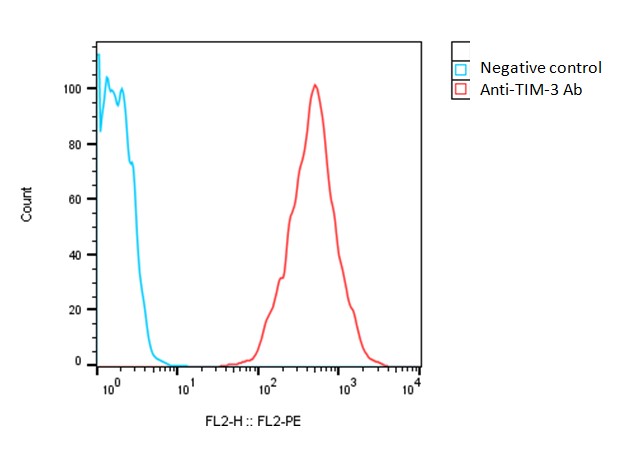
| Catalog Number | Product | Size | Price | |
|---|---|---|---|---|
| C3057 | Human TIM-3-CHO-K1 Stable Cell Line | 2 vials | $3950 | Order |
| Catalog Number | C3057 |
|---|---|
| Cell Line Name | Human TIM-3-CHO-K1 Stable Cell Line |
| Accession Number | NP_116171.3 |
| Host Cell | Adherent CHO-K1 |
| Quantity | Two vials of frozen cells (2x106 per vial) |
| Culture Medium | DMEM with 10% FBS, 4 µg/ml puromycin |
| Freezing Medium | 90% FBS and 10% DMSO |
| Storage | Liquid nitrogen upon receipt |
| Product Datasheet: | Download PDF |
Detection of human TIM-3 expression on human TIM-3-CHO-K1 stable cells using a PE-anti-human TIM-3 antibody (BioLegend, Cat. #345005)

T-cell immunoglobulin and mucin domain 3 (TIM-3, HAVCR2) is a type I transmembrane protein of the TIM family of proteins that functions asa critical negative regulator in the immune system, acting as a negative checkpoint in peripheral tolerance and innate immune and inflammatory responses. TIM-3 is primarily expressed on immune cells, including T cells, natural killer (NK) cells, dendritic cells, and macrophages. TIM-3 acts as a negative regulator of T cell function by inducing T cell exhaustion or apoptosis, thereby dampening excessive immune responses. It also plays a role in regulating the balance between pro-inflammatory and anti-inflammatory responses. In cancer, TIM-3 is upregulated in tumor-infiltrating lymphocytes and often co-expressed with other immune checkpoint molecules, leading to T cell exhaustion and impaired anti-tumor immune responses. TIM-3 has emerged as a promising therapeutic target for cancer immunotherapy with studies investigating the efficacy of TIM-3 blockade as a monotherapy or in combination with other immunotherapies, such as anti-PD-1/PD-L1 antibodies. Blocking TIM-3 signaling may help restore T cell function and enhance anti-tumor immune responses.
Anderson AC. Tim-3: an emerging target in the cancer immunotherapy landscape. Cancer Immunol Res. 2:393-398. 2014.
Sakuishi K, et al. Targeting Tim-3 and PD-1 pathways to reverse T cell exhaustion and restore anti-tumor immunity. J Exp Med. 207:2187-2194. 2010.
Das M, et al. Tim-3 and its role in regulating anti-tumor immunity. Immunol Rev. 276:97-111. 2017.